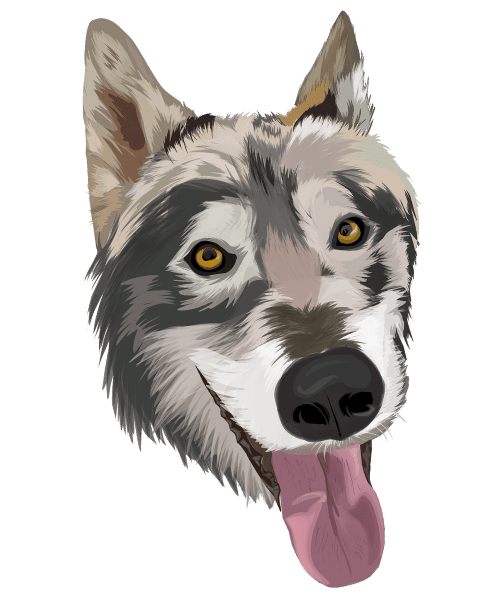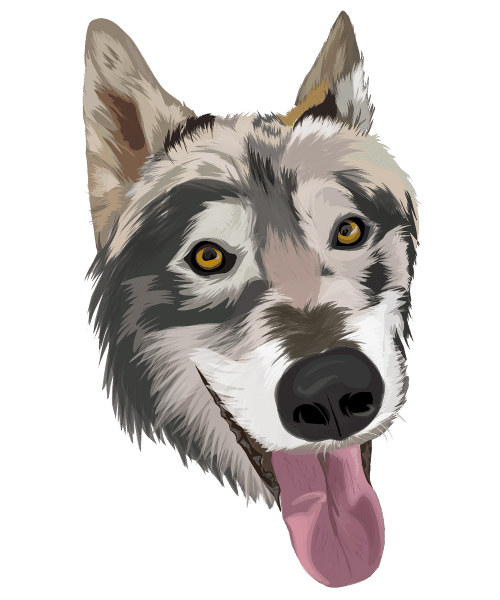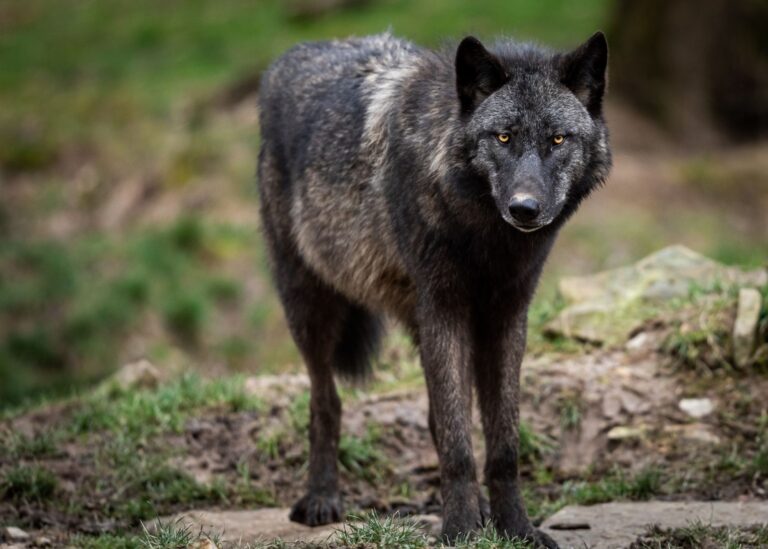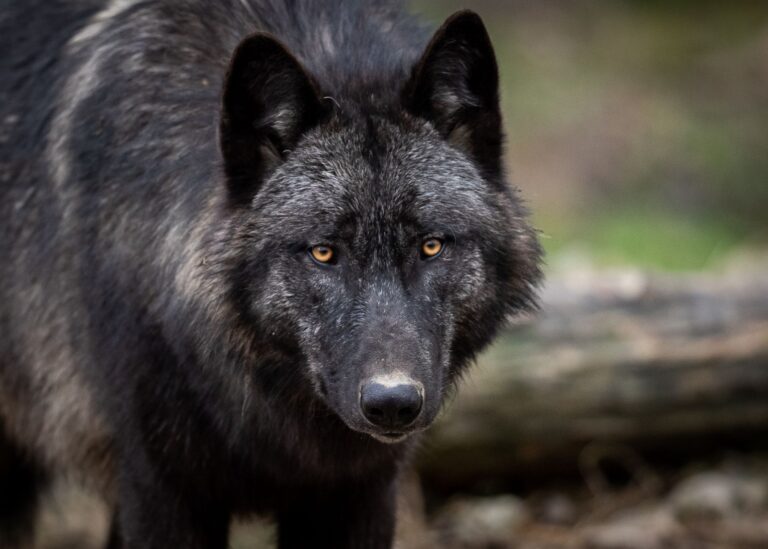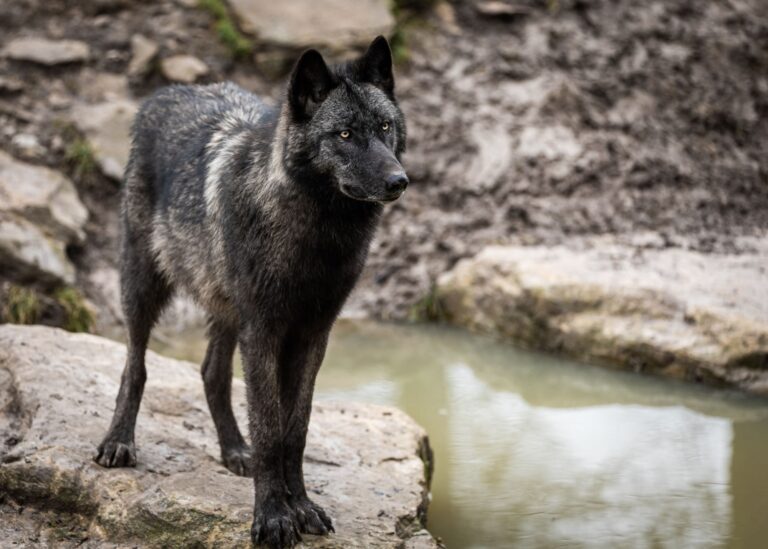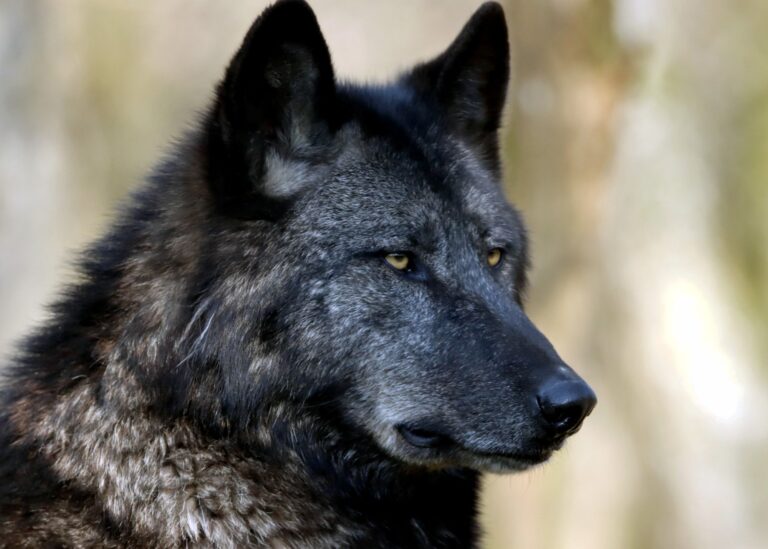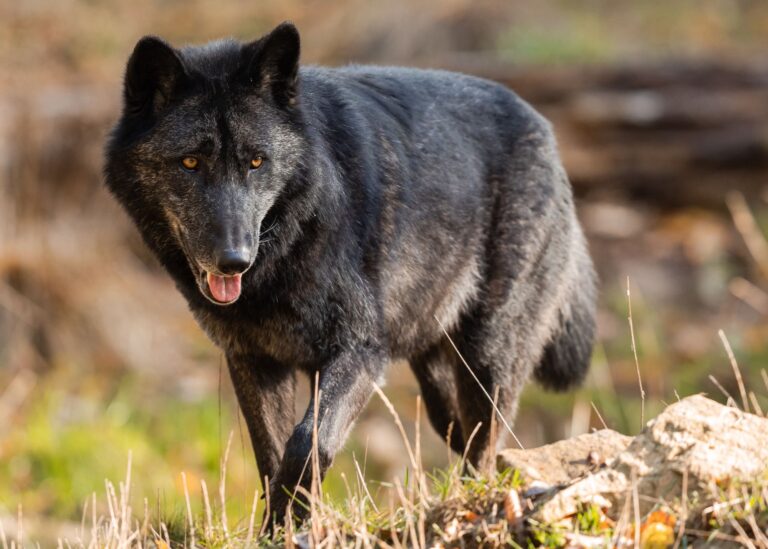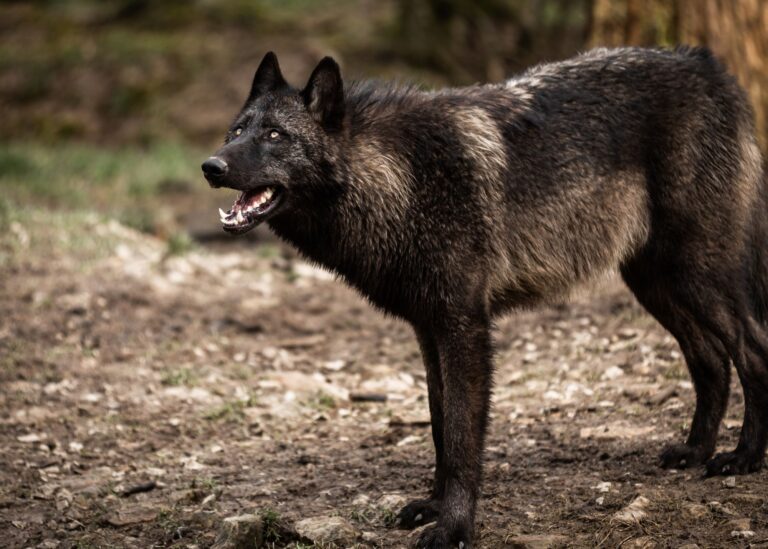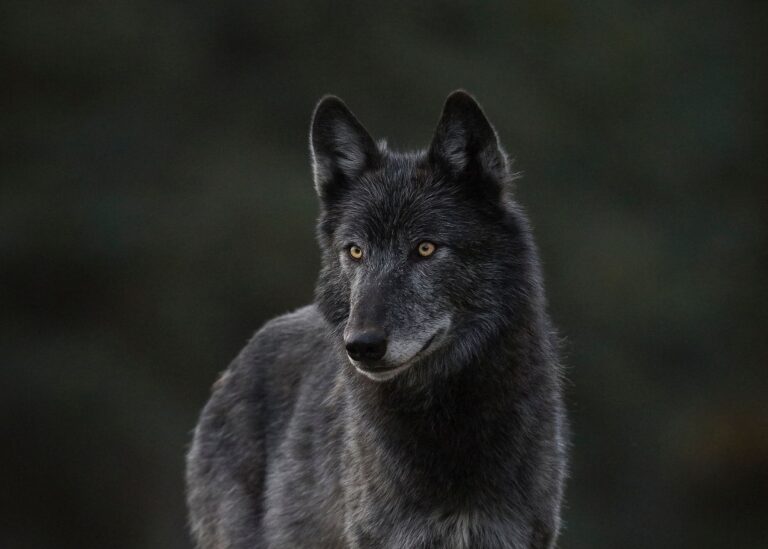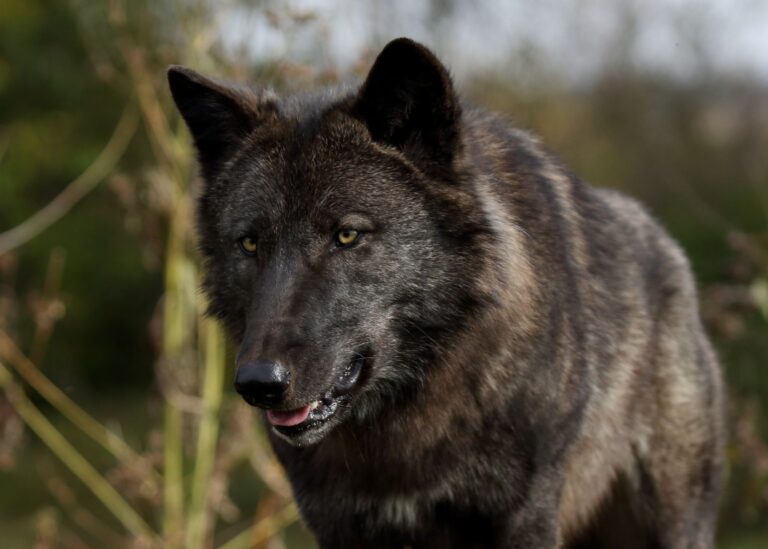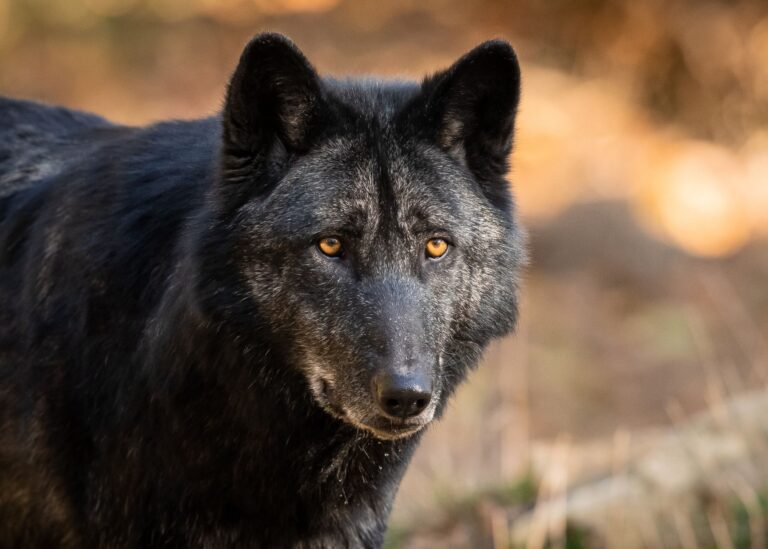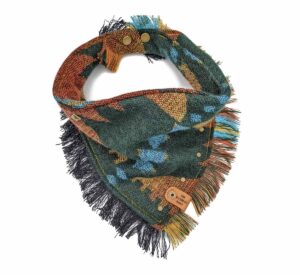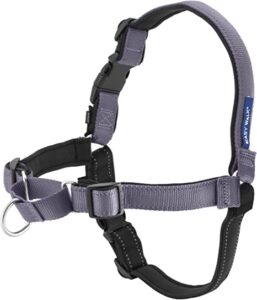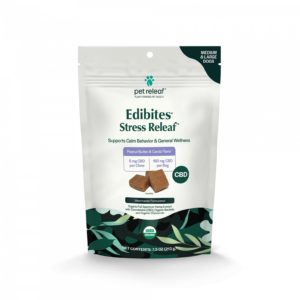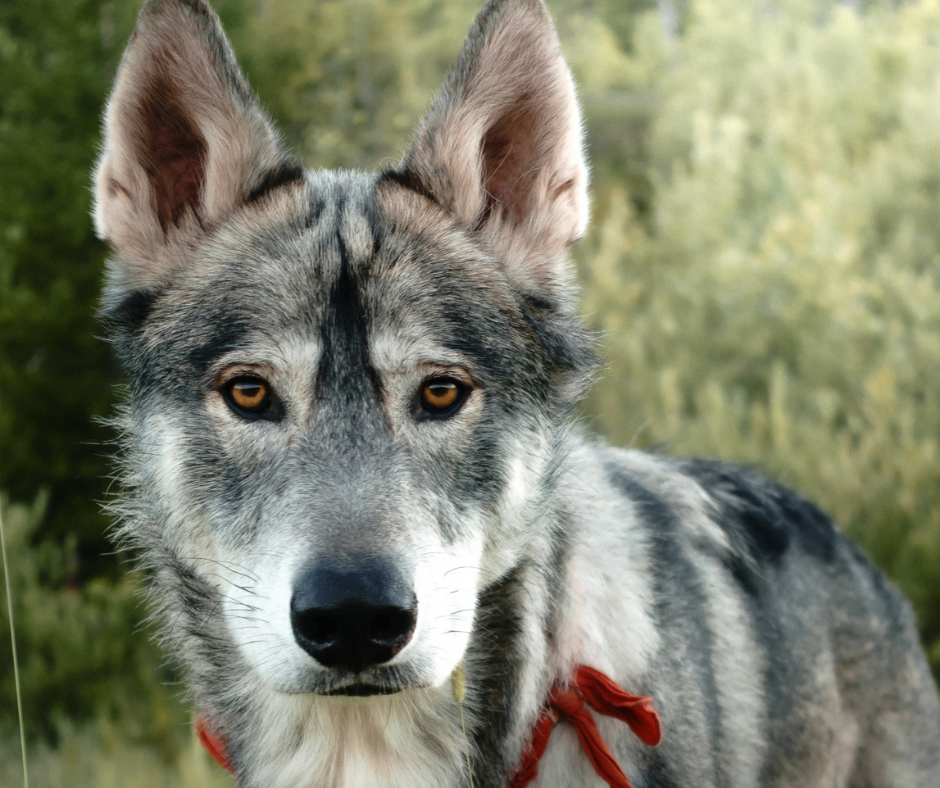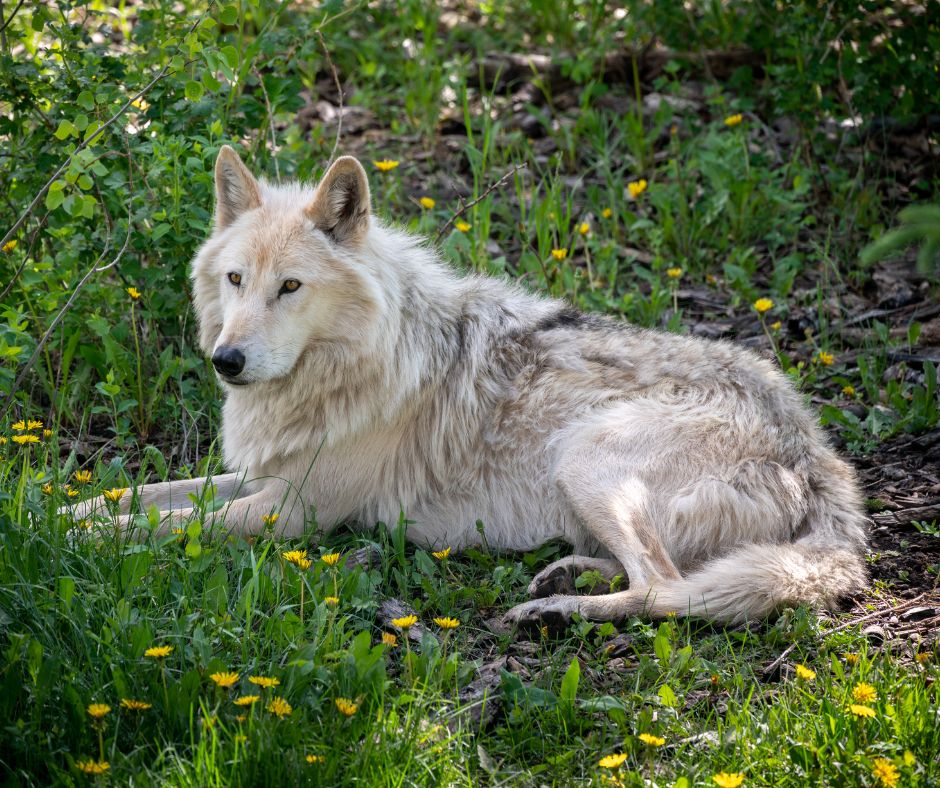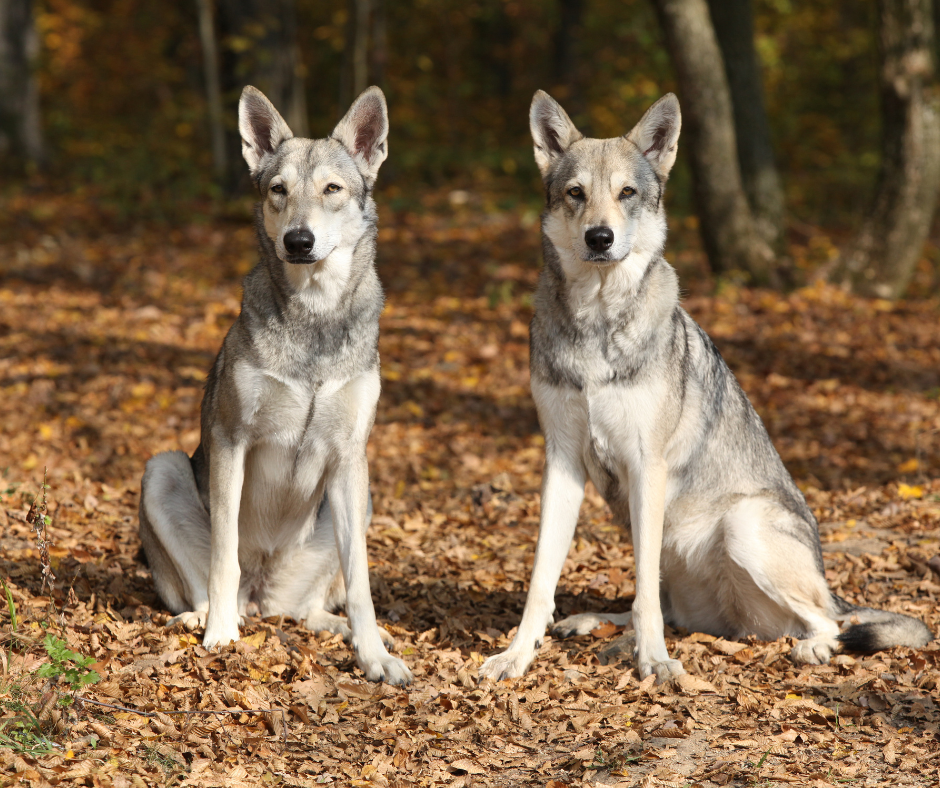Black Wolf Dog (Origins, Traits + Care)
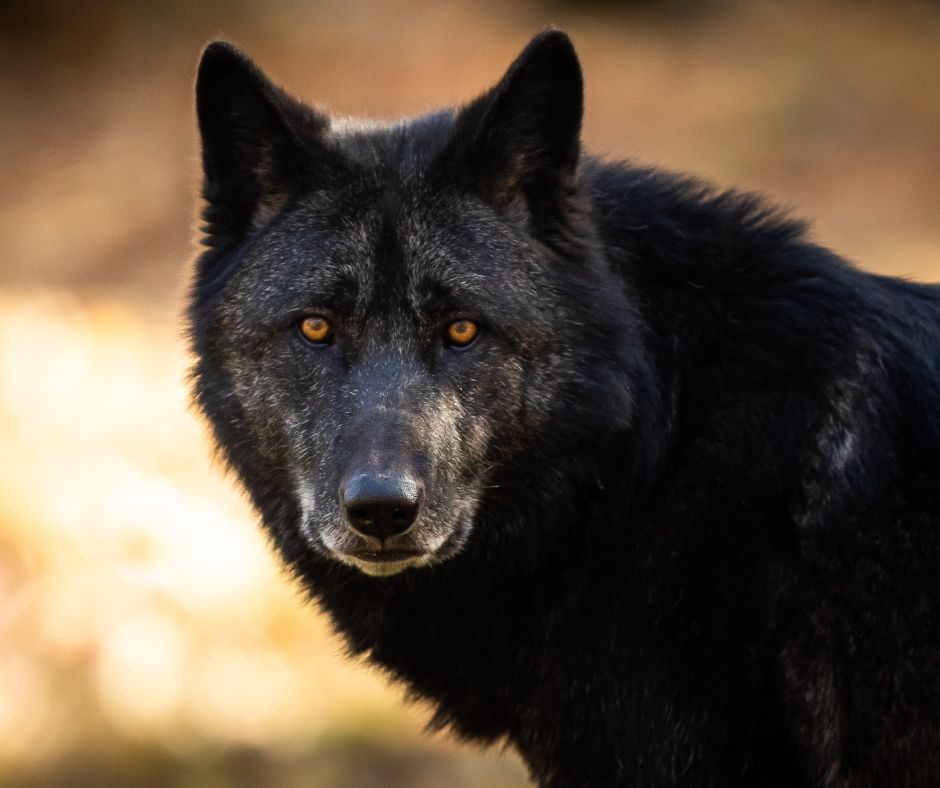
Black wolf dogs can be an intimidating sight with their striking appearance and wolf-like features. But despite their wild appearance, these dogs are actually a domesticated breed.
However, as captivating as black wolf dogs are, they are quite controversial, too.
Ever since we welcomed Cruze, our mid-content wolf dog into our family, we’ve become completely fascinated by wolves and wolf dogs. As a result, we’ve made it our mission to be a trustworthy source of information for other wolf dog owners out there.
In this post, we’ll share everything you need to know about owning a black wolf dog as a pet! You’ll learn all the nitty-gritty details, including their origins, appearance, temperament, exercise needs, and more! At the end, we will provide a list of must-have supplies for a black wolf dog!
Please note that the photos included in this article are stock images and may depict animals that are either full wolves or wolf dogs. This article is intended solely for informational purposes and does not provide conclusive identification of the animals shown.
Table of Contents
ToggleOrigins And History Of Black Wolf Dogs
The legacy of the black wolf dog reaches back about 15,000 years, when the trait likely arrived in North America through early immigrants. Native Americans and Europeans used black wolf dogs as hunting companions.
Genetic research has revealed that wolves with black pelts owe their distinctive coloration to a mutation introduced through interbreeding with domestic dogs, called the “K locus” gene, which is responsible for their dark coloration.
This was first noticed by Adolph Murie, who suggested that it contributed to the diversity of wolves’ coat colors.
When wolf dogs mate, they pass on two genes for coat color to their offspring, one from each parent. This results in either having two black genes (alleles), two gray genes, or one of each. If a wolf dog inherits one black gene and one gray gene, the black gene is dominant and the dog will have a black coat.
What is a Black Wolf Dog?
Black wolf dogs are not a standardized breed but rather the result of multi-generational selective breeding.
To create a black wolf dog, breeders will either breed a wolf dog with another wolf dog or a domestic dog.
However, it’s important to note that the vast majority of wolf dogs are actually 2, 3, or 4 generations removed from a pure wolf. This means that their lineage includes one or more dogs between the pure wolf and the wolf dog.
As generations pass, the offspring become less wolf-like in their appearance and behavior. This is because generations of descendants crossing between wolves and dogs produce offspring that are successively less wolf-like in appearance and behavior.
These dogs often exhibit physical characteristics resembling wolves, including a striking black coat. The term “black wolf dog” can encompass various breeds and mixes that showcase wolf-like features and are known for their distinctive black pelts.
For instance, many breeders will crossbreed a wolf dog with a domestic dog, often using a breed like a German Shepherd or Husky.
Depending on the amount of wolf genetics they have, black wolf dogs can be either high-content, mid-content, or low-content. Black wolf dogs can vary in size, appearance, and behavior.
While they are occasionally kept as pets, there are ethical concerns and debates surrounding their breeding and ownership due to the challenges that come with caring for them.
Black Wolfdog Appearance
Black wolf dogs have large, erect ears and a bushy tail. Their almond-shaped eyes, often encircled by a dark ring, are usually yellow and may range in shade from a light yellow to an amber hue.
Coat And Coloring
The defining feature of black wolfdogs is their striking black coat, which often showcases various shades of ebony.
Black wolf dogs have a double coat, comprising two distinct layers: an outer coat of coarse, straight fibers and an inner undercoat with a soft, wool-like texture. This coating helps them thrive in even the harshest of climates.
In winter, the undercoat acts as a natural insulator that traps body heat, keeping wolf dogs warm and comfortable even in freezing weather. During summer, the undercoat is shed, revealing the topcoat and making them more adaptable to warmer temperatures.
For black wolfdogs, it’s important to groom them regularly, especially during shedding. Brushing their fur at least once a week helps keep their coat healthy and looking good, while also preventing mats and tangles.
Weight & Size
Black wolf dogs possess a remarkable blend of power and elegance, with a well-built physique that is both striking and impressive. Black wolf dogs are known for their slender, elongated frame, which gives them a graceful and balanced gait.
The specific height, weight, and stance averages for black wolf dogs can vary significantly based on factors like their lineage, breed, and hybrid composition. As a general reference, lower content wolf dogs may stand around 26-34 inches tall, with average adult weights ranging from 60 to 120 pounds.
Black Wolf Dog Temperament And Personality
These canines exhibit a keen curiosity and intelligence, often displaying problem-solving skills and a desire to explore their surroundings.
Like their domestic counterparts, black wolfdogs form deep bonds with their human companions. Their loyalty and affection make them devoted family members.
Reflecting their wolf ancestry, these dogs may have an independent nature. They might exhibit behaviors that are different from traditional domestic dogs.
Black wolf dogs are generally not known to be aggressive, although they may bark or growl if they sense danger. They are not suited to be guard dogs as they tend to avoid confrontations and may flee from threats.
Black wolfdogs are typically energetic and require regular exercise to keep both their bodies and minds engaged. Activities like long walks, interactive play, and mental challenges are essential to their well-being.
Proper socialization during their early stages is vital. It helps them develop into well-adjusted companions, comfortable around different people, animals, and environments.
Black Wolf Dog Diet And Nutrition
For Black wolf dogs, a high-protein and high-fat diet is crucial due to their large size and active lifestyle. A raw diet can be a great choice since it provides the necessary nutrients in an easily digestible form. The ideal raw diet for a wolf dog should include:
- 50% muscle meat (such as beef, chicken, or lamb)
- 25% raw bone (beef, chicken, or lamb)
- 25% organs (including heart, liver, and kidney)
While raw diets may be expensive, a high-quality kibble diet with real meat and high protein content can also meet a Black wolf dog’s nutritional needs.
For more information on how to provide your wolf dog with a balanced and nourishing diet, check out our guide here!
Exercise Needs For A Back Wolf Dog
If you are considering getting a black wolfdog, keep in mind that they are high-maintenance pets that need a lot of exercise and mental stimulation. Proper exercise is essential to prevent them from becoming destructive. They are happiest in environments where they have plenty of room to move around and explore.
The exercise needs of wolf dogs can vary based on their individual traits, such as their content level (low, mid, or high), age, and overall health.
Daily exercise sessions that include both physical activity and mental stimulation are crucial to their well-being. This can involve long walks, runs, playtime, and engaging activities like obedience training, puzzle toys, and interactive games.
How Much Do Black Wolfdogs Cost?
If you’re on the hunt for a black wolf puppy for sale, be prepared to pay between $1,000 and $3,000, depending on the pup’s age and the breeder.
While this may seem like a hefty price tag compared to other breeds, it’s important to keep in mind that Black wolf dogs are not your average pet and require experienced handlers and plenty of space.
Before making the decision to bring one of these unique animals into your home, it’s crucial to consider all of the additional expenses that come with owning a wolf dog, such as food, vet visits, emergency plans, and a large outdoor enclosure.
Our recommendation is to only purchase from a reputable wolf dog breeder who requires an interview process.
Are Black Wolf Dogs Good Pets?
It’s possible for Black Wolf Dogs to be good pets, but only for owners who are dedicated and capable of providing the necessary care. Black wolf dogs are known for their intelligence and independence, which means they require a firm and consistent approach when it comes to training. However, if done correctly, they are loyal companions who will fiercely protect those they love.
Are Black Wolf Dogs Aggressive?
Black wolf dogs have a tendency to feel uncomfortable and uneasy around unfamiliar people and surroundings. However, it’s important to understand that any dog, including black wolf dogs, can display aggressive behavior under certain circumstances, but wolf dogs, in general, are more likely to run away than attack.
Moreover, during the late fall and winter seasons, black wolf dogs with a high wolf content may display aggressive behavior as a result of hormonal changes known as winter wolf syndrome.
Black Wolf Dog Supplies
We have a mid-content wolf dog, and from our personal experience, we’ve found that the following supplies have been incredibly helpful for us!
Dog Bandana: Cruze loves running free in the woods, but we understand that other hikers and dog owners might be concerned he’s a threat. To help put everyone at ease, we put a cute handmade bandana on him. It’s a great way to let others know that Cruze is friendly and approachable. And if you use the code CRUZE15 at checkout, you can get a 15% discount on your purchase!
No-Pull Harness: This harness has been amazing for taking Cruze on hikes and walks. He can get a little too excited and pull hard, but this harness helps redirect him towards us when he pulls, making it a lot easier to enjoy our walks together.
GPS Tracker: We love the Link My Pet GPS tracking device because it’s an easy and reliable way to keep an eye on Cruze’s location. It attaches easily to any collar and is lightweight and compact enough that it doesn’t weigh him down or cause any discomfort.
Calming Chews: Made with all-natural, organic ingredients and containing 5mg of CBD per bite, these calming chews have been a lifesaver for reducing Cruze’s anxiety during long car rides.
Black Wolf Dog Hybrid Final Thoughts
If you’re considering bringing a black wolf dog into your home, it’s crucial to do your research and understand the level of care and attention they require.
If you’re unsure if a wolf dog is the right fit for your family, we recommend volunteering at one of the many wolf sanctuaries in the US to learn more about these animals and their unique needs before making any decisions.
By educating yourself and others about the responsibilities of owning a wolf dog, we can help break the cycle of backyard breeding and prevent the devistating euthanization of these beautiful animals.
It’s also important to consider the legalities of owning a wolf dog breed in your area, as some places have restrictions or bans on them.
We’ve been lucky to provide our wolf dog with a happy and satisfying life, but I can’t deny that taking care of him requires a lot of effort.
If you have a black wolf dog and would like their photo to be featured in this blog post, send us an email!

